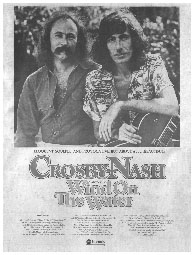- Home
- Introduction, Update Information, Links
- The Super Seventies "Classic 500"
- Readers' Favorite Seventies Albums
- Seventies Single Spotlight
- The Top 100 Seventies Singles
- Favorite Seventies Artists In The News
- Seventies Almanac - Year By Year
- Seventies Singles - Month By Month
- Seventies Albums - Month By Month
- Seventies Daily Music Chronicle
- Seventies Superstars In Their Own Words
- The Super Seventies Archives
- Seventies Trivia Quizzes & Games
- Seventies MIDI Jukebox
- The Super Seventies Bookstore
- The Super Seventies Photo Gallery
- Seventies' Greatest Album Covers
- Popular Seventies Movies & TV
- Seventies Celebrity Portrait Gallery
- Seventies Lyrics Hit Parade
- Top Seventies Artist Music Videos
- Seventies Usenet Music Forums
- Seventies Smiley Calendar
- EXTRA!
- Superseventies.com Facebook Page
- Superseventies.com Reddit Discussions
- The Super Seventies Blog
- Tweet The Seventies
- RockSite InfoBank
- Beatlefan Site
- Thanks For Your Support! / Top Sellers
- Search The Rock Site/ The Web

Wind on the Water
David Crosby and Graham Nash
ABC ABCD-902
Released: September 1975
Chart Peak: #6
Weeks Charted: 31
Crosby & Nash's first album together in more than three years represents their best studio work since CSN&Y's Deja Vu. While it exhibited a refreshing spareness of texture, Crosby & Nash's other dual effort suffered from a lack of strong material, with the notable exception of Nash's haunting "Southbound Train." Crosby's and Nash's solo albums have also emphasized each artist's weaknesses -- in Crosby's case, spiritless lack of direction; in Nash's, simplicity verging on the simplistic. Though neither artist can be counted a great writer or singer, together on Wind on the Water their strengths are abundantly in evidence. An impressive coproduction, Wind features many well-known guest musicians, the most important contributions those of guitarist Danny Kortchmar and David Lindley, keyboardist Craig Doerge and drummer Russ Kunkel.
These talents mesh with astonishing force on the album's rock centerpiece, Nash's "Love Work Out." A harmonized chant, performed in the style of Neil Young's "Ohio," the song concludes with an extended arrangement for four guitars that keeps accumulating intensity before being faded. Two other rockers, Crosby's "Low Down Payment" and Nash's "Take the Money and Run," both bitterly cynical commentaries on success, also evidence a resurgence of energy and emotion.
Several songs feature the acoustically textured lyricism with multiple vocals that Crosby & Nash pioneered so successfully with "Guinnevere" and "Lady of the Islands." The loveliest are the joint compositions, "Naked in the Rain," a philosophical mood piece, and "To the Last Whale," a song in two segments. The first part, written by Crosby, is called "A Critical Mass" and consists of beautiful, fugal part singing without words or instrumentation. The second part, Nash's "Wind on the Water," must rank with "Lady of the Islands" and "Southbound Train" as one of his three finest songs; it also boasts the only one of Nash's politically motivated lyrics whose imagery sustains its rhetoric:- Over the years you have been hunted
- By the men who threw harpoons
- And in the long run he will kill you
- Just to feed the pets we raise,
- Put the flowers in your vase
- And make the lipstick for your face.
If Wind on the Water shows Crosby & Nash at the height of their musical powers, it is also suffused with melancholy, resignation and anger. In Crosby's "Carry Me," he pictures his dying mother; in "Bittersweet," he communicates a feeling of being cold, confused and near middle age. Nash's surrealistic "Cowboy of Dreams" faces the fear of death, and "Love Work Out" violently asserts the need for a lasting personal relationship. Wind on the Water is not an album made by, for or about kids, but the work of men who face being beached like whales on a sandbar by the youth culture and who are determined to survive. They will.
- Stephen Holden, Rolling Stone, 12/4/75.
Bonus Review!
Among the finest of the splinter albums to come out of the CSNY camp, this album was paced by Crosby's leadoff track, the moving "Carry Me," and by its closer, the vocal showcase of "The Last Whale." * * * *
- William Ruhlmann, The All-Music Guide to Rock, 1995.
![]() Reader's Comments
Reader's Comments
No comments so far, be the first to comment .
![]() Main Page
| Readers' Favorites
| The Classic 500
| Other Seventies Discs
| Search The RockSite/The Web
Main Page
| Readers' Favorites
| The Classic 500
| Other Seventies Discs
| Search The RockSite/The Web




